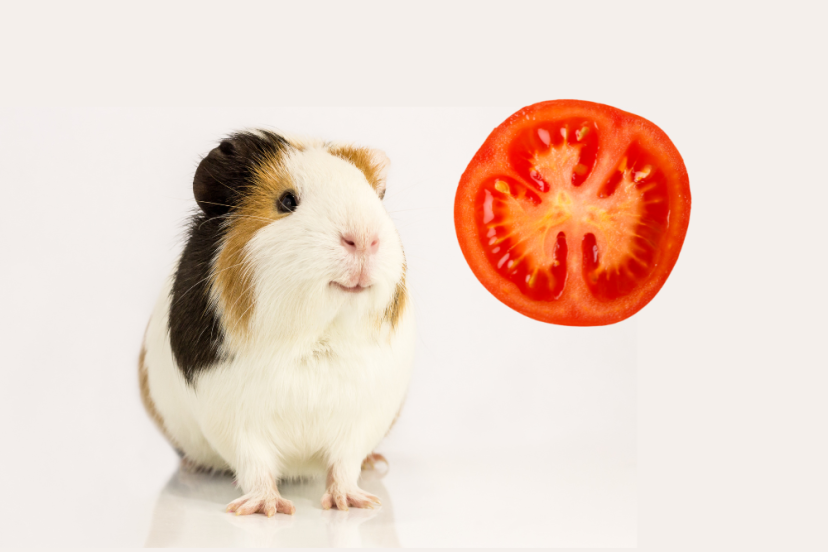Can Guinea Pigs Eat Tomatoes? A Deep Dive
As a long-time guinea pig owner, I’ve often found myself pondering about the diverse foods my furry friends can safely enjoy. After eating a salad, I found myself asking: “Can guinea pigs eat tomatoes?”.
Today, I’m delving into a common household vegetable (or fruit, depending on who you ask!) – the tomato.
Guinea Pigs and Their Diet
Our little cavies have quite specific dietary needs. Their love for fresh veggies and fruits is well-known, but not everything we eat is suitable for them.
Nutritional Value of Tomatoes
Tomatoes are packed with nutrients that can be beneficial for humans. But what about for guinea pigs?
Tomatoes aren’t just a delicious addition to our meals; they can also serve as a delightful treat for our furry friends. But what nutritional value do they offer to guinea pigs specifically? Let’s delve into how these nutrients cater to the unique needs of our cavies.
Vitamin C Galore:
Guinea pigs have a peculiar trait in common with us humans: they can’t synthesize their own vitamin C. This makes their dietary intake crucial. Tomatoes, being rich in vitamin C, can provide a significant boost. A deficiency in this vitamin can lead to scurvy in guinea pigs, a condition characterized by lethargy, sore joints, and other symptoms.
Beneficial Minerals:
Potassium: While potassium supports heart and muscle function in humans, it plays a similar role in guinea pigs, ensuring their tiny hearts and muscles function optimally.
Folate: Guinea pigs, especially those that are pregnant, benefit from folate as it aids cell division and overall health.
Hydration:
Given the high water content in tomatoes, they can be a hydrating snack for guinea pigs, especially during warmer weather. This helps keep their system flushed and can support kidney function.
Dietary Fiber:
Guinea pigs have a sensitive digestive system, and fiber plays a crucial role in maintaining its health. Tomatoes offer a good fiber source, promoting smoother digestion and preventing constipation.
Antioxidants Tailored for Tiny Bodies:
The antioxidants found in tomatoes, especially lycopene, are beneficial for guinea pigs too. They help combat oxidative stress and can contribute to overall health and longevity.
Low in Calories and Sugars:
Tomatoes are low-calorie treats, which is perfect for guinea pigs. High-sugar foods can be harmful to them, leading to obesity and other health issues. Tomatoes strike a balance by offering taste without a hefty calorie tag.
While the nutrients in tomatoes can be a boon for guinea pigs, it’s essential to remember that they should only be a small part of their diet. The primary food source should always be hay, complemented by pellets and a variety of fresh vegetables. As always, introducing any new food, including tomatoes, should be done gradually to monitor for any adverse reactions.
Benefits of Tomatoes for Guinea Pigs
Tomatoes, when offered in moderation, can be more than just a tangy treat for your guinea pig. They come packed with several health benefits tailored to the unique needs of these adorable creatures. Let’s explore the myriad ways tomatoes can boost the well-being of our guinea pig companions.
Vitamin C Boost:
As already established, guinea pigs cannot produce their own vitamin C, making external sources vital. A consistent intake of this vitamin prevents scurvy, a condition that can be harmful to your furry friend. Tomatoes serve as an excellent occasional supplement to their primary vitamin C sources.
Hydration Helper:
With a high water content, tomatoes can help keep your guinea pig hydrated. Especially during the warmer months, a juicy slice of tomato can replenish lost fluids and ensure that they remain active and lively.
Digestive Aid:
The dietary fiber in tomatoes aids the digestive processes of guinea pigs. Regular bowel movements are crucial for them to prevent gastrointestinal issues, and the fiber in tomatoes supports this function.
Antioxidant Advantages:
The rich antioxidants, including lycopene found in tomatoes, are vital in combating free radicals in guinea pigs. This aids in preventing diseases and ensures the longevity and health of your pet.
Supports Immune System:
A strong immune system is pivotal for the health of guinea pigs, and the combination of vitamins and minerals in tomatoes can aid in bolstering their immunity. This ensures they remain resilient against common illnesses.
Low-Calorie Treat:
Given that obesity can be a concern for domesticated guinea pigs, it’s essential to offer them low-calorie snacks. Tomatoes fit the bill, ensuring they can enjoy their treats without the risk of weight gain.
Bone Health:
Tomatoes contain a good amount of vitamin K, which plays a role in bone health. This ensures that your guinea pig has strong bones, reducing the risk of fractures.
Possible Concerns with Tomatoes
While tomatoes can be a delightful treat for guinea pigs, offering numerous health benefits, there are certain precautions and potential concerns that every guinea pig owner should be aware of. Serving tomatoes inappropriately or in excess could inadvertently harm your furry friend. Here’s a breakdown of the potential risks and concerns:
Acidity Levels:
Tomatoes are naturally acidic. Consuming too many tomatoes can lead to mouth sores or ulcers in guinea pigs. It’s essential to monitor your pet for any signs of discomfort or mouth ulcers after they consume this fruit.
Green Parts of the Tomato:
The green parts, including the stem, leaves, and even the green immature fruit, contain solanine, a toxic compound that can be harmful to guinea pigs. Always ensure you remove these parts before serving tomatoes to your guinea pig.
Pesticide Residue:
Non-organic tomatoes might be sprayed with pesticides that can be harmful to guinea pigs. To minimize this risk, always opt for organic tomatoes or wash them thoroughly under running water before serving.
Choking Hazard:
Whole cherry or grape tomatoes can pose a choking risk. Always chop tomatoes into bite-sized pieces appropriate for your guinea pig’s size to avoid any potential choking hazards.
Digestive Upset:
Overfeeding tomatoes can cause digestive discomfort, leading to soft stools or diarrhea. It’s crucial to introduce tomatoes gradually and monitor for any digestive changes.
Allergic Reactions:
Though rare, some guinea pigs might be allergic or sensitive to certain foods. If it’s your guinea pig’s first time trying a tomato, monitor for any signs of allergic reactions, such as itching, swelling, or difficulty breathing.
Risk of Obesity:
While tomatoes themselves are low in calories, an imbalanced diet, or overfeeding treats (even healthy ones) can contribute to obesity. Make sure tomatoes and other treats are only a small part of your guinea pig’s diet.
Calcium Content:
Tomatoes contain calcium. While calcium is essential for guinea pig health, especially for growing pups and pregnant females, excessive calcium can lead to the formation of bladder stones in adult guinea pigs. Therefore, it’s essential to balance their diet and ensure they’re not getting too much calcium from all their food sources combined.
How to Safely Feed Tomatoes to Guinea Pigs
Ensuring that your guinea pig enjoys the benefits of tomatoes without facing any adverse effects hinges on how you serve this vibrant fruit. Here’s a guide to ensure that your guinea pig can safely relish this juicy treat:
Choose Organic:
Whenever possible, opt for organic tomatoes. Organic produce reduces the risk of pesticide residues that might harm your pet. If you’re purchasing non-organic tomatoes, make sure to wash them thoroughly to remove any potential chemicals.
Preparation is Key:
Remove Green Parts: Always ensure that you remove the stem, leaves, and any green parts of the tomato as these contain solanine, which is toxic for guinea pigs.
Wash Thoroughly: Wash the tomatoes under running water to remove any dirt or residues.
Cut into Appropriate Sizes: Chop the tomatoes into small, bite-sized pieces to minimize the risk of choking.
Gradual Introduction:
If it’s the first time your guinea pig is trying out tomatoes, introduce them slowly. Start with a small piece and observe how your pet reacts to it. This slow introduction not only helps in gauging any allergic reactions but also prevents digestive upsets.
Moderation is Essential:
Remember, while tomatoes are nutritious, they should not be the mainstay of your guinea pig’s diet. A few pieces once or twice a week are more than enough.
Monitor After Feeding:
After you’ve given your guinea pig some tomato, keep an eye on them. Watch for signs of mouth sores due to the fruit’s acidity or any symptoms of an upset stomach.
Avoid Overripe or Spoiled Tomatoes:
Always offer fresh tomatoes. Overripe or spoiled tomatoes can cause digestive issues and might contain harmful bacteria.
Variety in Diet:
While tomatoes are beneficial, ensure that they are a part of a varied diet. Combine tomatoes with other safe fruits and veggies to provide a range of nutrients.
Storage:
Store any unused tomato portions in the refrigerator for freshness. If you plan to give them to your guinea pig later, ensure they’re brought back to room temperature before serving.
How Often Can Guinea Pigs Eat Tomatoes?
Tomatoes, with their juicy texture and rich nutritional profile, can undoubtedly be a delightful treat for guinea pigs. However, like many good things, they should be given in moderation. Here’s a guide on the ideal frequency for serving tomatoes to your guinea pig:
Occasional Treat:
Tomatoes should be considered an occasional treat and not a daily staple in your guinea pig’s diet. Their main diet should be primarily composed of hay, supplemented with a variety of vegetables.
Recommended Frequency:
You can offer tomatoes to your guinea pig once or twice a week. This frequency ensures that they get the benefits of the fruit without overdoing it.
Portion Size Matters:
When you do offer tomatoes, a couple of small cherry tomatoes or one or two slices from a larger tomato is sufficient for one guinea pig. It’s essential to ensure that the portion size is appropriate to prevent overfeeding.
Monitor Their Reaction:
Every guinea pig is unique, and what suits one might not be ideal for another. Pay attention to how your pet reacts after eating tomatoes. If they show any signs of digestive upset or other adverse reactions, it might be a good idea to reduce the frequency or eliminate tomatoes from their diet.
Balance with Other Veggies:
Offering tomatoes should not replace other crucial veggies in their diet. Ensure that you rotate between different vegetables throughout the week, giving your guinea pig a well-rounded nutritional intake.
Caution with Juiciness:
Due to their high water content, tomatoes can sometimes cause loose stools in guinea pigs if given in large quantities. This is another reason to stick to moderate servings and observe your guinea pig’s stool consistency.
Observing Your Guinea Pig After Feeding
Always monitor your guinea pig after introducing any new food. Look out for any unusual behavior or digestive issues.
Alternatives to Tomatoes
If you’re looking for other fresh treats, consider bell peppers, celery, cucumber, grapes, apples, or even watermelons. Both are guinea pig favorites!
Can Guinea Pigs Eat Tomatoes Conclusion
While tomatoes can be a delightful treat for guinea pigs, it’s crucial to serve them in moderation and be aware of potential risks. This will ensure your guinea pig enjoys a healthy and long lifespan. As always, keep your cavy’s health in mind with every treat you offer.
Can Guinea Pigs Eat Tomatoes FAQs
Can guinea pigs eat cherry tomatoes?
Yes, but ensure they’re cut into small pieces.
How often should I treat my guinea pig with tomatoes?
A slice once a week is a good rule of thumb.
Are tomato seeds safe for guinea pigs?
It’s best to remove large seeds, but small ones should be fine.
Can baby guinea pigs eat tomatoes?
It’s preferable to introduce tomatoes when they’re a bit older and stick to their primary diet initially.
What parts of the tomato plant are toxic to all breeds of guinea pigs?
Avoid all green parts like leaves and stems. Only offer the ripe tomato fruit.




